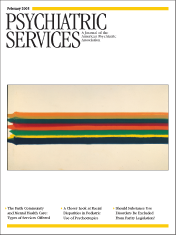Perceived Reasons for Loss of Housing and Continued Homelessness Among Homeless Persons With Mental Illness
Abstract
OBJECTIVE: The objective of this study was to examine the reasons for the most recent loss of housing and for continued homelessness as perceived by homeless persons with mental illness. METHODS: A total of 2,974 currently homeless participants in the 1996 National Survey of Homeless Assistance Providers and Clients (NSHAPC) were asked about the reasons for their most recent loss of housing and continued homelessness. The responses of participants who had mental illness, defined both broadly and narrowly, were compared with responses of those who were not mentally ill. The broad definition of mental illness was based on a set of criteria proposed by NSHAPC investigators. The narrow definition included past psychiatric hospitalization in addition to the NSHAPC criteria. RESULTS: A total of 1,620 participants (56 percent) met the broad definition of mental illness, and 639 (22 percent) met the narrow definition; 1,345 participants (44 percent) did not meet any of these criteria and were categorized as not having a mental illness. Few differences in reasons for the most recent loss of housing were noted between the participants with and without mental illness. Both groups attributed their continued homelessness mostly to insufficient income, unemployment, and lack of suitable housing. CONCLUSIONS: Homeless persons with mental illness mostly report the same reasons for loss of housing and continued homelessness as those who do not have a mental illness. This finding supports the view that structural solutions, such as wider availability of low-cost housing and income support, would reduce the risk of homelessness among persons with mental illness, as among other vulnerable social groups.



